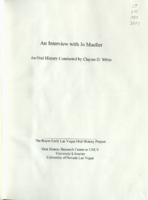Search the Special Collections and Archives Portal
Search Results

Jack Weinstein and Polly Weinstein interview, April 12, 2018: transcript
Date
Archival Collection
Description
Tower of Jewels is one of those iconic Las Vegas businesses that continues to thrive. At the time of this interview, Jack Weinstein is in his nineties and “retired.” With him is his daughter Polly Weinstein, who in addition to being involved in the business management has her own custom designed jewelry line, aptly named The Jeweler’s Daughter. As the youngest of six children born to Jewish Russian immigrants Joseph and Pauline (Polly is named for her grandmother), Jack was raised in a dangerous neighborhood of Detroit, Michigan. His youthful enterprise included collaborating and then splitting up with his brothers in a jewelry business, before eventually moving west to Los Angles in the early 1960s. On his own, Jack became a wholesale salesperson representing lines of watches to other businesses. Included in his list of clients was Al Sanford’s Tower of Jewels in Las Vegas. The two became friends and Al suggested setting up a partnership between Al’s son and Jack in 1964. Eventually
Text

Transcript of interview with Eleazar "Al" Martinez by Marcela Rodriguez-Campo, October 2, 2018
Date
Archival Collection
Description
In his lifetime, Eleazar Martinez has climbed both literal and figurative mountains as an avid outdoorsman and social justice advocate for Latinx issues. Born in Sweetwater, Texas, Eleazar (Al for short) grew up connected to the land and his family. Al comes from a large family with strong ties in Texas and Mexico. His mother worked the fields and his father was a construction worker who instilled in their children the importance of a strong work ethic and the pursuit of an education. Al shares about growing up during a time when Spanish was banned from schools and children would get punished if they were caught using their home languages. His experiences developed his aspiration to serve his community and fight for people’s rights. After a short stint in the Navy, Al followed his instincts and sought out a college education and majored in sociology. His interest in social issues lead him to serve in a range of roles from psychiatric support, community education outreach, and counseling. At one point, Al even helped mediate tensions between gangs and law enforcement in order to prevent violence from erupting. Since arriving in Las Vegas in 1998, Al has been working alongside diverse communities to build solidarity. Today, he works as a supervisor for the Whitney Recreation Center and leader in Hispanics Enjoying Camping, Hunting, and the Outdoors (HECHO). As Al would describe himself, he is “a proud Mexican Latino American, a Tejano with a Chicano attitude”.
Text

Moises Denis interview, January 11, 2019: transcript
Date
Archival Collection
Description
Interviewed by Marcela Rodriguez-Campo. Laurents Bañuelos-Benites, Maribel Calderón, and Barbara Tabach also participate in the questioning. Moises "Mo" Denis is a Cuban American born in Brooklyn, New York. He served as the first Latino Majority Leader in the Nevada State Senate and has been involved in public service for over 30 years. As a leader in the Church of Latter Day Saints and his involvement with supporting Latinx initiatives, Mo has been able to increase the representation of Latinos in politics and support educational reform. While early on his family moved around a lot, they finally settled in Las Vegas and have continued to grow their family. Mo is a Rancho High School alum and went on to graduate from Brigham Young University as a music major. He first started his career by opening a music store, but later began working in the tech industry. Eventually, through his involvement in the PTA, Mo was appointed to serve on the Clark County Library Board. There he was involve
Text

Apolonio Sauceda interview, August 13, 2019: transcript
Date
Archival Collection
Description
Interviewed by Barbara Tabach and Monserrath Hernández. Born in 1927 to Mexican immigrant parents, Apolonio spent his youth in the Kansas City, Kansas area. Arrived in Las Vegas and was a map maker for Clark County. Very involved in local Latino community, NALA, Veterans organizations, and was an actor on the side. Subjects: NALA, American Legion, Lt. Colonel in Nevada Color Guard
Text

Transcript of interview with Daniel Kaminski by Brian Corcoran, March 14, 1978
Date
Archival Collection
Description
On March 14, 1978, Brian Corcoran interviewed Twenty-One dealer Daniel Kaminski (born November 17th, 1947 in New Jersey) about his life in Southern Nevada. The two discuss Kaminski’s occupational history and gambling practices amongst tourists. They then go in depth on the rise of gambling establishments across the United States and the impacts it may have on Las Vegas. The interview concludes with a discussion on the role of dealers in casinos.
Text

Transcript of interview with Kenny Kerr by Dennis McBride, May 29 & 30, 2001
Date
Archival Collection
Description
In the years following this interview, Kerr continued entertaining, although he never returned to the Las Vegas Strip. Kerr performed at OUTfest Phoenix, at Palm Springs’ Awesome August celebrations, Las Vegas’ National Coming Out Day event, and for the Gay and Lesbian Community Center’s Youth Service’s Division. Kerr also gave shows at small bars and restaurants such as Café Nicolle and DeStefano’s in Las Vegas, the Wilde Goose in Cathedral City, California, and the Plush Room in San Francisco. There were rumors that Kerr was set to replace emcee Joey Arias in Cirque du Soliel [2004] and Frank Marino in La Cage [2005], but neither turned out to be true. Instead, Kerr performed in such local gay nightclubs as Flex, Sasha’s, Krave, Suede, and, on July 31, 2012, at the Onyx Theatre in Commercial Center. In 2006, Kerr made peace with his former rival, Frank Marino. Kerr’s son, Kristin Vidal, made Kenny a grandfather with his own son, Alexander. It was clear during his July 2012 performan
Text

Wilma Cooper interview, February 27, 1977: transcript
Date
Archival Collection
Description
On February 27, 1977, collector Sara Finklea interviewed housekeeper, Wilma Cooper (born December 19th, 1913 in Rock Springs, South Wyoming) in her home in Boulder City, Nevada. This interview covers Boulder City and Henderson.
Text

Transcript of interview with Mary Ann Culver by Stephen R. Johnson, March 22, 1981
Date
Description
On March 22, 1981, Stephen R. Johnson interviewed his friend, food and beverage cashier, Mary Ann Culver, (born on November 2nd, 1913, in Walton, Indiana) in her home in Las Vegas, Nevada. This interview covers the Union in the 1950s, entertainers, showrooms, strikes, and organized crime. During the interview Mary also discusses Elvis, shows at the Thunderbird, ownership of the Thunderbird, weather, the local bus system, traffic, and Howard Hughes.
Text

Transcript of interview with Jo Mueller by Claytee White, August 26, 2011
Date
Archival Collection
Description
Jo Ann and Hal Mueller arrived in Las Vegas in 1956 when he accepted a meteorologist position. In addition to raising their two children, Jo was active in PTA, worked for Weight Watchers, and was a volunteer with League of Women voters. She tells the story of meeting Hal and their whirlwind romance to the altar, moving to the Caroline Islands and eventually choosing Las Vegas over Seattle as their next career assignment. Las Vegas became their permanent home and Jo reflects on life and experiences here.
Text

Frieda Steinberg interview, September 10, 2014, November 10, 2014, August 15, 2017: transcript
Date
Archival Collection
Description
Interviewed by Barbara Tabach.
Text
